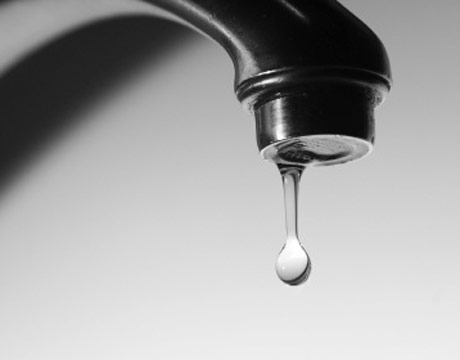Over the years, I’ve done some wacky deprivation experiments.
For months, I ignored a burned out bathroom bulb so I could teach myself to see well in the dark. After college, I spent the summer walking shoeless in city streets to toughen my soles (and soul).
Since those days, I’ve learned that if you wait, life will offer you many unscripted challenges that can teach you to live more with less.
Just last week the pump that brings running water into my house failed. I live in the woods and this was not my first bout with dry faucets. Big storms have knocked down power lines that feed electricity to our pump. Normally the rain and snow that create this chaos announce their plans to visit long before they arrive. We prepare for potential water outages by filling the bathtub and big pots before the pump shuts down.
Unfortunately, last week’s malfunction came without warning. One minute I was making a scrumptious dinner. A half hour later, the sink, full of dirty dishes, went dry.
My reliable plumber rarely takes vacations. But the surprise drought occurred during the one week when he was out of town.
I decided to see if I could survive a waterless weekend until he returned.
With the help of some kind neighbors, I managed to take one shower and fill my water pitcher. They also let me cart a few large pots of water to my house so I could wash vegetables, clean my hands and manage general hygiene. But I had to measure the expenditure of each drop of water so I wouldn’t become a nuisance.
This required extraordinarily mindful behavior.
About 60 hours after my taps went dry, I started writing so I could record the basic lessons of this deprivation cycle.
I’m sure we all use way more water than we realize.
If you are conservation oriented, just try the experiment of documenting how much water you use in a day. How many times do you turn on the tap? How often do you wash your hands—or someone else’s?
Judging by the number of trips I made to fetch water, I’m far more water dependent than I ever imagined—and that’s with limited showers! It took three daily trips to the neighbor’s house to haul back the water I needed to wash dishes, flush toilets, clean countertops, cleanse hands after downward dogs and have water at mealtime. On each trip I filled a gigantic soup pot (hand and body washing), a paint bucket (for the toilet), a kitty litter pail (also for the toilet), a filter pitcher (drinking, washing food) and a normal pot (just-in-case water).
Just-in-case water helped me to brush my teeth, provide fresh water to my cockatiel and keep our petunias alive on the third-consecutive sunny day. The just-in-case pot was also handy for teaching my germ-conscious boyfriend how to wash his hands without the aid of a faucet. He did not like the idea that we only had one toilet flush between us for overnight use. But we worked together to maximize the impact of that flush.
The experience also taught me that, given the choice between a life without running water and one without electricity, I think water-free might be more easily managed—at least for someone in my profession. As a writer, I need to keep the batteries of my laptop and phone charged so I can work and speak to employers.
Surviving a power outage means plugging your life into someone else’s outlets.
But electricity costs money. Not so with water. Where I live, people are willing to give you water because it’s plentiful and free. Sharing a few gallons won’t affect our personal supply or bank account. There are also many public places where we can use a bathroom for the obvious reasons—and the less obvious ones like brushing our teeth or washing our face.
This also says something about the lower value we place on water in some parts of the country. In Pennsylvania, where I live, water is abundant and taken for granted by most users who never stop to think about its availability or its quality. This is less true in other places I’ve lived, like Mexico, where frequent droughts and poor public utilities force homeowners to get smarter about corralling, using and recycling rainwater. Or New Mexico—where the presence or absence of ground water can mean the difference between enjoying or abandoning your home.
Regardless of where you rank in the consumption continuum, learning to be mindful of water use is an excellent way of learning to be mindful, period. Should you discover that you are getting too carried away with wasteful habits, try creating a deprivation experiment of your own.
Eliminate one precious resource from your life for a few days.
When the fast is over, you will notice that your old negligence has been transformed into another resource that fuels the mindful life: gratitude.
~
~
Love elephant and want to go steady?
Sign up for our (curated) daily and weekly newsletters!
~
~
Apprentice Editor: Kim Haas / Editor: Emily Bartran
Photo: Maegen Tintari via Flickr

 Share on bsky
Share on bsky







Read 8 comments and reply